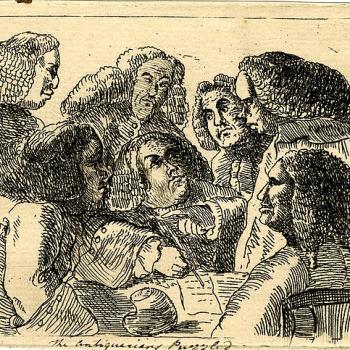In the previous article, we discussed the sad fact that most people aren't bothering to take a step back from their societal influences to ask real questions and go on a quest for truth; that the masses blindly take upon themselves the assumptions about life and reality inherent in the society that raised them.
For example, in our time and place, there are certain in-born assumptions, and to claim anything contrary to them in a modern-day so-called "progressive" institution will result in people looking at you like you fell off of Mars and will get you branded as "uneducated" or "radical." One so-called natural and obvious given of our time is that truth is relative—"You have your truth; I have my truth. And if I don't believe your truth, then your truth is not truth for me."
However, there is an obvious response to this: "So are you saying that's the truth?"
When you get down to it, the 'truth is relative' claim is making the same claim of objective reality and truth as all other claims. It is saying 'I am absolutely right about truth being relative, and anyone who believes anything contrary to what I believe is wrong'. Ironically, we find that despite the fact that such "liberal open-mindedness" is associated with free-spirited all-inclusiveness, it is the bearers of this message and belief system who seem to take charge on every social issue, thereby making the by-default claim of 'I'm right. You're wrong. And I'm going to do my best to force you to change'.
This cowardly hiding behind the guise of open neutrality while making a non-stated built-in claim and assumption of objective correctness brings to mind the all-too common response that I confront to the belief-in-God question.
Approximately 50 percent of the students I meet claim they are agnostic, unsure about whether or not there is a God. Out of that 50 percent, guess how many observe any kind of religious practice (other than the occasional prayer and charity sponsorship of a "Brovember" moustache).
That's right, 0 percent.
I have yet to meet the individual who tells me, "I am not sure whether or not there is a God who gave the Torah so I am keeping the commandments just in case." (No, in this case being a nice guy does not count as religious practice. No agnostic is nice simply because the Torah says "Love thy neighbor." They are nice because of societal norms and conditioning. Show me something this agnostic does that his society isn't also preaching.)
Hiding behind the neutrality of agnosticism works in theory, but in practice there are only two options: believer or denier. Either there is a God who gave the Torah or there is not a God who gave the Torah. Just as whether or not you are aware of gravity, the effects of smoking, or the fact that 2+2=4 does not change those realities and their effects, whether or not you are aware of any reality does not change that reality and its effects.
Any realist knows this.
In fact, if we were to gather together a believing member of every belief system on Earth—a Jew, Muslim, Christian, Hindu, Buddhist, atheist, Nazi, etc.—you might think there is nothing you can find that they would all agree on. However, if they are all realists, there is one thing they will all see eye-to-eye on, and that is that there is nothing more important than to figure out who (if any of them) is right. There is nothing more paramount than to clarify what is truth and correct in the world. After all, given that we are looking to get the most out of life, it is of utmost importance to uncover what is reality in order to make the most in-tune, educated, and best decisions possible regarding all aspects of life.
Similarly, when we are approached by a lost Jewish soul giving Judaism one last chance before he leaves it for good, we must begin by showing the depths of what Judaism really has to offer the individual, to explain the "whys" of Judaism, to break false stereotypes and stigmas, and to bring meaning and understanding to the seemingly hollowed "traditions" and "rituals" of Judaism.
12/2/2022 9:02:50 PM





